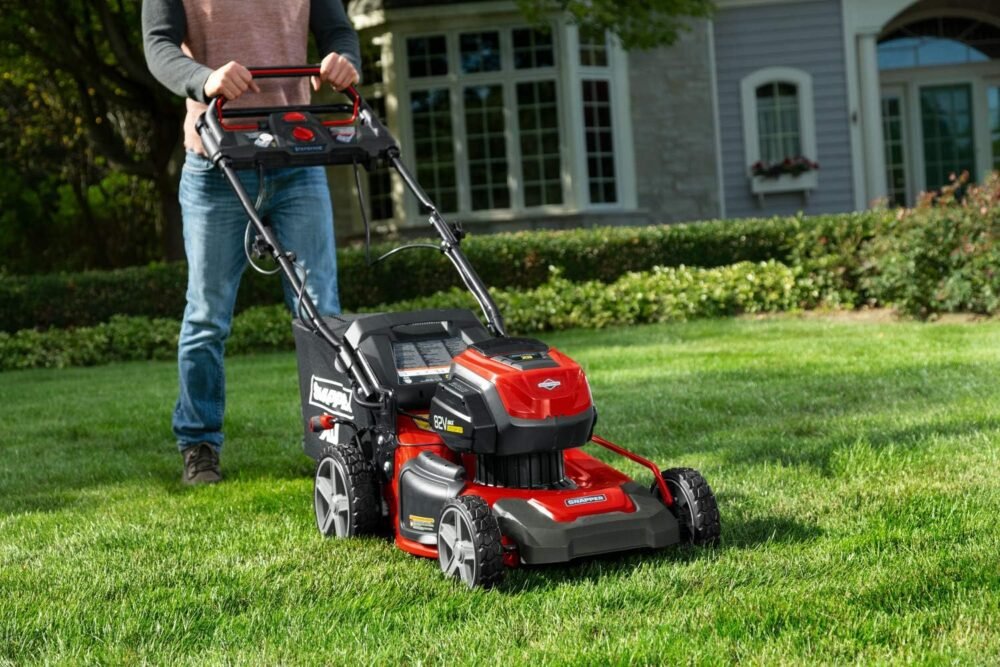Are you tired of dealing with the deafening noise of traditional gas mowers every time you need to trim your lawn? Well, we’ve got some good news for you! In this article, we’ll explore the difference in noise levels between electric and gas mowers, helping you choose a quieter and more peaceful alternative for maintaining your lawn. Say goodbye to the disruptive and ear-piercing sounds of gas mowers, and say hello to a tranquil and serene mowing experience with electric mowers. So, sit back, relax, and let’s discover which mower is the quieter option for your lawn care needs.
Overview
When it comes to choosing a mower, noise level may not be the first factor that comes to mind. However, the importance of noise level in mowers should not be underestimated. The noise produced by mowers not only affects the user, but also has an impact on the environment, health and safety, and even local regulations. In this article, we will explore the key differences between electric and gas mowers when it comes to noise level, and delve into the various factors that influence noise levels in each type of mower.
Electric Mowers
Electric mowers have gained popularity in recent years due to their numerous advantages. One of the standout features of electric mowers is their significantly lower noise levels compared to gas mowers. The use of electric motors instead of internal combustion engines greatly reduces the noise produced during operation. This makes electric mowers a great choice for those who live in noise-sensitive areas or have concerns about the noise impact on their neighbors.
Comparing the noise levels of electric mowers to gas mowers, electric mowers are generally much quieter. On average, electric mowers produce noise levels between 70 and 75 decibels (dB), which is about as loud as a conversation in a restaurant. In contrast, gas mowers can reach noise levels of 90 dB or more, which is equivalent to the noise level of a motorcycle or a chainsaw. The significant difference in noise levels between the two types of mowers makes electric mowers a more favorable option for those looking for a quieter mowing experience.
Several factors influence the noise level of electric mowers. One key factor is the design of the mower itself, including the blade configuration, cutting height, and motor power. Higher power electric motors can produce more noise, so choosing a mower with an appropriate motor power for your needs is essential. Additionally, the type and condition of the cutting blade can also affect noise levels. Dull or damaged blades can create more noise as they struggle to cut through the grass.
To further reduce noise levels, electric mowers often incorporate noise reduction technologies. These technologies may include vibration control mechanisms, sound-damping materials, and optimized airflow design to minimize noise production. These measures help to create a quieter mowing experience without compromising on performance.
Gas Mowers
While electric mowers excel in low noise levels, gas mowers have their own advantages that make them a popular choice for many users. Gas mowers are known for their power and ability to tackle larger yards and tougher grass. However, their noise level tends to be higher compared to electric mowers, which is an important factor to consider, especially for those living in noise-sensitive areas.
Comparing the noise levels of gas mowers to electric mowers, gas mowers generally produce much higher noise levels. The typical noise level of a gas mower ranges from 85 to 95 decibels (dB), which can be quite loud and potentially disruptive to both the user and surrounding neighbors. The noise produced by gas mowers is comparable to that of a chainsaw or a busy street.
Several factors can influence the noise levels of gas mowers. The key factor is the internal combustion engine used in gas mowers, which inherently produces more noise compared to electric motors. The design and condition of the cutting blade, as well as the housing and muffler design of the mower, also contribute to the overall noise level.
To address the noise issue, some gas mowers incorporate measures to reduce noise levels. These measures include better insulation and sound-damping materials within the mower’s body, as well as improved mufflers to minimize noise emissions. While these measures can help to some extent, gas mowers will likely always be louder compared to electric mowers due to the nature of their power source.
Environmental Considerations
In addition to noise levels, the environmental impact of mowers is another important aspect to consider. Gas mowers contribute to air and noise pollution due to the emissions from their internal combustion engines. Electric mowers, on the other hand, produce zero emissions during operation, making them a more environmentally-friendly option.
Noise pollution, a byproduct of gas mowers, can have detrimental effects on the environment. Excessive noise can disturb wildlife, interfere with their natural behaviors, and disrupt ecosystems. It can also negatively impact birds by interfering with their communication and navigation systems. Additionally, noise pollution can lead to stress and anxiety in animals, affecting their overall health and well-being.
In contrast, electric mowers significantly reduce noise pollution. With lower noise levels, they cause less disturbance to wildlife and ecosystems, promoting a more harmonious coexistence between humans and the environment. Choosing electric mowers can contribute to reducing noise pollution and its negative impacts on the environment.
Health and Safety
Noise levels can also have a significant impact on human health and safety. Prolonged exposure to high noise levels can result in hearing damage, tinnitus (ringing in the ears), and even hearing loss over time. Therefore, it is crucial to consider the noise level of a mower and take appropriate measures to protect your hearing.
When using gas mowers with their higher noise levels, it is recommended to wear hearing protection such as earmuffs or earplugs. This helps to reduce the risk of hearing damage and allows users to mow their lawns safely without compromising their hearing health.
With electric mowers, the lower noise levels lessen the need for hearing protection, although it is still advisable to take precautions and assess the noise level in your specific environment. The reduced noise levels not only contribute to a more comfortable mowing experience but also help protect your hearing in the long run.
Local Regulations
Local regulations vary when it comes to noise restrictions for mowers. Some neighborhoods or municipalities may have specific noise limits in place, particularly for certain times of the day or week. It is essential to be aware of the noise regulations in your area and understand how they apply to both electric and gas mowers.
In general, electric mowers are more likely to comply with noise regulations due to their lower noise levels. Even if there are no specific regulations, being considerate of your neighbors and minimizing noise disturbance is always a good practice. Electric mowers allow you to mow your lawn without causing unnecessary noise-related conflicts with your community.
On the other hand, gas mowers may have a higher chance of exceeding noise limits imposed by local regulations. The noise levels produced by gas mowers can attract attention and potentially disturb your neighbors. Compliance with noise regulations becomes essential to maintain a harmonious neighborhood environment.
User Experience and Feedback
User perceptions of noise levels play a crucial role in shaping their overall mowing experience. Electric mowers tend to be favored by users who prioritize a quieter operation. The lower noise levels contribute to a more peaceful mowing experience, allowing users to focus on the task at hand without causing disturbance to themselves or others.
Customer reviews and comparisons often highlight noise-related aspects when evaluating mowers. Users appreciate electric mowers for their quieter operation, with many expressing satisfaction with the reduced noise levels. Electric mowers are often described as a great option for those living in noise-sensitive areas or for those who prefer a more serene mowing experience.
On the contrary, noise-related user complaints are more commonly associated with gas mowers. The higher noise levels are often a point of dissatisfaction and have led some users to seek quieter alternatives. While gas mowers have their own advantages, the noise factor can sometimes overshadow those benefits for users who prioritize a quieter mowing experience.
Cost Comparison
The cost of mowers is another important aspect to consider when making a decision. Electric mowers and gas mowers differ not only in their noise levels but also in terms of cost.
In terms of initial cost, electric mowers generally have a higher upfront price compared to gas mowers. This is partly due to the cost of the electric motor and battery, which contribute to the overall price of the mower. However, it is important to consider the long-term cost savings associated with electric mowers.
Electric mowers are more energy-efficient, requiring less maintenance and fuel. This results in lower operational costs compared to gas mowers. Gas mowers require the regular purchase of gasoline, oil, and other maintenance expenses associated with their internal combustion engines. These ongoing costs can add up over time, making electric mowers a more cost-effective option in the long run.
Maintenance and Durability
Maintenance requirements and durability also play a role in the overall ownership experience of mowers. Electric mowers often have fewer maintenance needs compared to gas mowers. There is no need for gas or oil changes, spark plug replacements, or carburetor adjustments. Electric mowers generally require less frequent maintenance, saving users time and effort.
The noise level of a mower can also have an impact on its lifespan. Constant exposure to higher noise levels can potentially accelerate the wear and tear of internal components, reducing the overall durability of the mower. With electric mowers operating at lower noise levels, users can expect a longer lifespan for their equipment when compared to gas mowers.
Reliability and durability comparisons between electric and gas mowers can vary depending on the specific models and brands. It is advisable to research and consider user reviews and ratings to gauge the overall reliability and durability of each mower option before making a purchase decision.
Conclusion
In conclusion, the noise level of mowers is an important factor to consider when choosing between electric and gas mowers. Electric mowers offer significant advantages in terms of noise reduction, making them a quieter and more user-friendly option. They are particularly well-suited for those in noise-sensitive areas or for those who prioritize a more peaceful mowing experience. Gas mowers, although powerful and able to handle larger yards, tend to produce higher noise levels, which can be disruptive and may require hearing protection.
When deciding between electric and gas mowers, it is essential to consider factors such as noise level, environmental impact, health and safety, local regulations, user feedback, cost, maintenance, and durability. By weighing these factors, you can make an informed decision that aligns with your specific needs and preferences.
As technology advances, it is likely that further advancements in noise reduction will be made for both electric and gas mowers. Manufacturers continue to explore innovative ways to minimize noise levels while maintaining optimum performance. Keeping an eye on future trends and improvements in noise reduction technologies can help you stay updated and make the best choice when purchasing a mower. Remember, a quieter mower leads to a more enjoyable and harmonious mowing experience for all.






